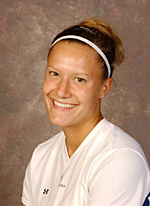
To learn how Imus' remarks and subsequent fallout have affected one female athlete and communication major at UD, UDaily spoke with Leah Geib, a UD communication master's degree candidate who, while an undergraduate, won recognition and numerous awards for her prowess on UD's field hockey team, including All-America and NCAA Woman Athlete of the Year status her senior year.
Below, Geib, who is in her second year of graduate school at UD and has done research on the images of women athletes in the media, weighs in on bad press, good trends and ground gained by women athletes both on and off the field.
Q: I understand you've done a good bit of research on the portrayal of women athletes by the media and advertising industries. Are there any trends you've noticed, positive or negative, on which you'd like to comment?
A: From my research, I've found that there has been an increase in the coverage of female athletes, and if you look at where we started to where we are now, there has also been an extensive boost in terms of sports participation rates among females. However, despite the increased opportunities for female athletes to be showcased, coverage of them still lags significantly behind that of male athletes. And, in terms of quality coverage, that is still sorely lacking.
What I mean by that is that when female athletes are shown, they are usually marginalized and not shown solely for their athletic accomplishments. There is always some type of ambivalent message that accompanies the coverage. For instance, they'll be shown in an athletic setting, but the reporter will also comment on how attractive they are, or what their off-court attributes are. So there's always a 'but' to their athleticism, as if it's a secondary attribute. They're women athletes, but--.
Q: Do you have any theories on what causes and perpetuates these trends?
A: A lot of female athletes try to get the coverage, but they go about it in the wrong way, or they're almost forced to go about it in the wrong way, because in order to get endorsements they sometimes have to be shown in this pretty way, or in a way that's not specific to their sport or athleticism.
Q: What are your thoughts on the Don Imus remarks?
A: Comments like his are always disheartening.
Q: Would you consider the ensuing fallout to be an over-reaction, an under-reaction, or equal to the offense?
A: I think it is right that there is an uproar, because a lot of times comments like these go under the radar, and have become so commonplace that people are almost desensitized.
.jpg)
Q: You were a starter for all four years on UD's field hockey team, as well as an All-America player and an NCAA Woman Athlete of the Year finalist when you were an undergraduate at UD. What were the general reactions you got from friends, classmates and others during your involvement in competitive sports?
A: I had a positive experience as an athlete. I had a lot of success on the field and a lot of support both on and off the field from friends, family and the community.
Q: From your experience as an athlete and from your research, would you say that attitudes toward female athletes are going in a positive direction?
A: I definitely think we're moving in the right direction, but change is a slow process, so it's going to take some time, and the playing field still isn't even.
When you look at the media and see female athletes shown in scantily clad outfits on the front of [magazines like] Sports Illustrated and also compare the number of times female athletes are showcased on covers compared to males--from 1997-2004 there were 29 out of 416 covers devoted to women as compared to men--it can be discouraging. And when you open the sports magazines and see male athletes portrayed for their athletic ability, in their uniforms, in fierce stances, and then flip a page and see an objectified image of a female athlete, such as Jenny Finch, striking a sexy pose with a plastic bat, the overriding message appears to be that female athletes aren't to be taken seriously.
All in all, though, despite the disparity, female athletes have made great strides, and there are also more women in sports broadcasting. How the media is going to serve that up, however, is still an issue.
There is a very good Nike campaign right now that's something along the lines of 'big butts, thunder thighs and tomboy knees.' That's the one part that's not so great about it--that it emphasizes different parts of the female anatomy. But its overall message is really great, because it shows female athletes for their muscle and for being powerful in an athletic, competitive sense.
Sexism definitely goes on all the time, though, and in some cases even gets lauded, as is the case with the Brick Bat Prize--an annual contest and award given to the most sexist sports writing and coverage. Recently, the prize went to a reporter for his coverage of Anna Kournikova at the International Women's Tennis Cup because of his keen interest in all the suggestive poses. There is also the Hall of Fame for the Sexiest Female Athlete of the Year, because such competitions get more notice and votes than events that showcase women athletes solely for their athleticism.
Research has shown that sexism contributes to dropout rates of female athletes, attitudes toward them and widespread role conflicts. When the focus is placed on an athlete's appearance rather than her ability, it definitely generates negative impressions in viewers. And the stress female athletes feel to be both beautiful and good at their sport causes the kind of stress that results in problems such as eating disorders and dropout rates. These are big prices to pay, and there is definitely room for improvement.
Article by Becca Hutchinson


